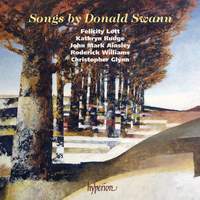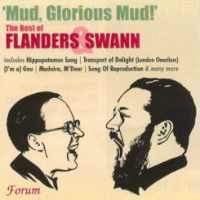Interview,
Christopher Glynn on the songs of Donald Swann
 There probably aren't too many twentieth-century song-writers whose style is well known and loved enough to have been the subject of affectionate parody on a mainstream TV sketch-show, but the comic songs which Donald Swann wrote in collaboration with Michael Flanders (marvellously sent up on The Armstrong and Miller Show as 'Brabbins and Fyffe') only tell part of the story of this hugely productive and versatile composer.
There probably aren't too many twentieth-century song-writers whose style is well known and loved enough to have been the subject of affectionate parody on a mainstream TV sketch-show, but the comic songs which Donald Swann wrote in collaboration with Michael Flanders (marvellously sent up on The Armstrong and Miller Show as 'Brabbins and Fyffe') only tell part of the story of this hugely productive and versatile composer.
When this beautiful, astonishingly diverse album landed in my playlist a month or two ago, it took me a little while to realise that all of the songs here were by one person - thanks to some rather incompetent downloading on my part, the tracks were initially untitled, and there was a certain serendipity to the experience of listening 'blind'! There were songs which I'd have sworn were by Gurney or Quilter, others which brought to mind Britten or Bolcom in cabaret mode, and still others which sounded like they could have been English translations of Rachmaninov or Tchaikovsky.
The project's the brain-child of pianist Christopher Glynn, who's assembled a crack team of British singers (including Felicity Lott and Roderick Williams) to bring 'Swann without Flanders' to life. I spoke to him last week about Swann's influences and inspirations, and the overlap between his hitherto neglected art-songs and the rumbustious world of Madeira, misplaced French horns and procrastinating gas-men for which he's best known…
Rather like Arthur Sullivan (who’s also recently had a 2-CD set devoted to his songs!), Swann is a composer whose partnership with a lyricist has overshadowed his ‘solo’ work - in terms of both his development and later reputation as a ‘serious’ song-composer, would you say that the partnership with Michael Flanders emerges as having been a blessing, a curse, or somewhere between the two?
Sullivan is a good comparison in the sense that Donald Swann’s reputation as one half of a hugely successful double-act inevitably overshadowed what he did with the rest of his life. I’m sure Donald would have seen the Flanders and Swann years as a blessing overall, but there’s no doubt he was uneasy with some aspects of their success, including the wealth it brought and the long tours which left him little time to compose. On the other hand, there’s a sense that he brought all his experience as a light entertainer to his music, which often seems to bridge so-called ‘popular’ and ‘serious’ styles.
How did this project come about, and how much digging through the archives was involved?
It came about through a chance conversation I had with the writer and musicologist John Warrack, who mentioned to me one day that his old friend Donald Swann had left a substantial catalogue of now almost forgotten songs. I was fascinated that there might be on or two lost tunes to discover, and so arranged to go and meet the baritone Leon Berger, archivist and keeper of the Swann flame. When I arrived at his house I was amazed to see manuscripts stacked floor-to-ceiling on every wall in sight – far more material than I ever imagined, including well over 600 songs. We spent a really memorable day exploring the dusty manuscripts and old cassette tapes of the Swann archive.
Swann’s solo song-writing career seems to have been more or less on hold during the heyday of ‘Flanders & Swann’ - how much of a difference in style is in evidence between the pre- and post-Drop of a Hat years?
Pre-Hat, there is a real sense of Swann absorbing influences from all directions and throwing them in the melting pot. Many of the early songs reveal his Russian heritage (his father had been a doctor in Russia, before fleeing to England with his Azerbaijani wife after the Revolution), while others explore folk idioms. Post-Hat, especially in the very late songs, he seems to arrive at a more sparse style in which all the influences are more integrated. But throughout his life he remained, at heart, a melodist, whose music speaks directly and unpretentiously with a natural flow and ease - nothing in Swann is ever calculated or contrived.
Do any of the hallmarks of the Hat songs spill over into these compositions (or vice versa, come to that)? I’m thinking particularly of the Betjeman settings (which one could almost imagine Flanders performing!) on the one hand, and ‘Twenty Tonnes of TNT’ on the other…
Yes, I think there is a lot of crossover with the Betjeman settings especially. One aspect of Swann I notice over and over again is his ability to set a comic poem to music that catches every detail of its satire, while at the same time being drawn to the longing that lies beneath. Perhaps it’s the other side of his ‘daffy’ onstage persona – the melancholy behind the clown’s smile? We hear it in famous Flanders and Swann numbers like The Armadillo and Misalliance, but it’s also a perfect fit for the mixture of parody and lyricism found in Betjeman’s poems, such as A Subaltern’s Love Song. It is hard to think of any composer who has captured the world of Betjemania better.
The booklet-notes suggest that Swann was very committed to ploughing his own furrow rather than being overly concerned with how his contemporaries were writing – but do you think it’s possible to detect the influence of other, earlier generations of song-composers (from the English song tradition, or further afield)?
He was one of life’s originals, going his own way and embracing all sorts of diverse influences. Both the ‘pastoral’ and ‘parlour’ styles of English songwriters like Quilter are there in the background, but Tchaikovsky and Rachmaninov are also in the mix, not to mention exotic touches drawn from his love of Eastern, especially Greek, folk music. Throw in a natural feeling for ‘light’ music, a serious piano technique and an exceptionally wide literary taste, and you start to get an idea of the many ingredients that combine to form a unique style.
What’s the performance-history of these songs? The vast majority are recording premieres, but are any of them actually receiving their first official performances here?
Most have been performed, not least by Swann himself, who often half-sung, half-spoke the songs to his own accompaniment in a highly individual way that compensated for any vocal limitations with bags of charisma and a wonderful rhythmic flexibility. Several well-known singers also championed his songs while he was alive, but among the present generation they seem largely forgotten. Hopefully these new performances on disc by a really special team of singers - Dame Felicity Lott, Kathryn Rudge, John Mark Ainsley and Roderick Williams - might help change that…
Swann was clearly extremely widely read and seems to have been particularly attracted to rather nostalgic and even elegiac poetry – do you think there was an element of him seeking out texts that gave him rein to explore aspects of his craft that went untapped during his work with Flanders?
There was so much more to him than his stage persona as the bespectacled ‘daffy, strange odd-ball’ at the piano. Towards the end of his partnership with Flanders, he talked of ‘new emotions’ that could not be expressed in ‘nice little melodies’ of comic songs. He was spiritually restless and looked for solace in both literature and religion. He found it in a wide range of writers - from Shakespeare and Pushkin to Tolkien, Hesse and folk-poets - just as his religious explorations encompassed Anglicanism, Orthodoxy and Islam, before finally settling on Quakerism. Towards the end of his life he turned more and more towards mystic poetry – but did so with little solemnity. That’s all part of Swann’s magic – the way he combines depth of feeling with a lightness of spirit.
Songs by Donald Swann
Christopher Glynn, Dame Felicity Lott, Kathryn Rudge, John Mark Ainsley, Roderick Williams
Songs by Donald Swann was released on Hyperion on 30th June.
Available Formats: 2 CDs, MP3, FLAC, Hi-Res FLAC
Michael Flanders, Donald Swann
Available Format: CD




